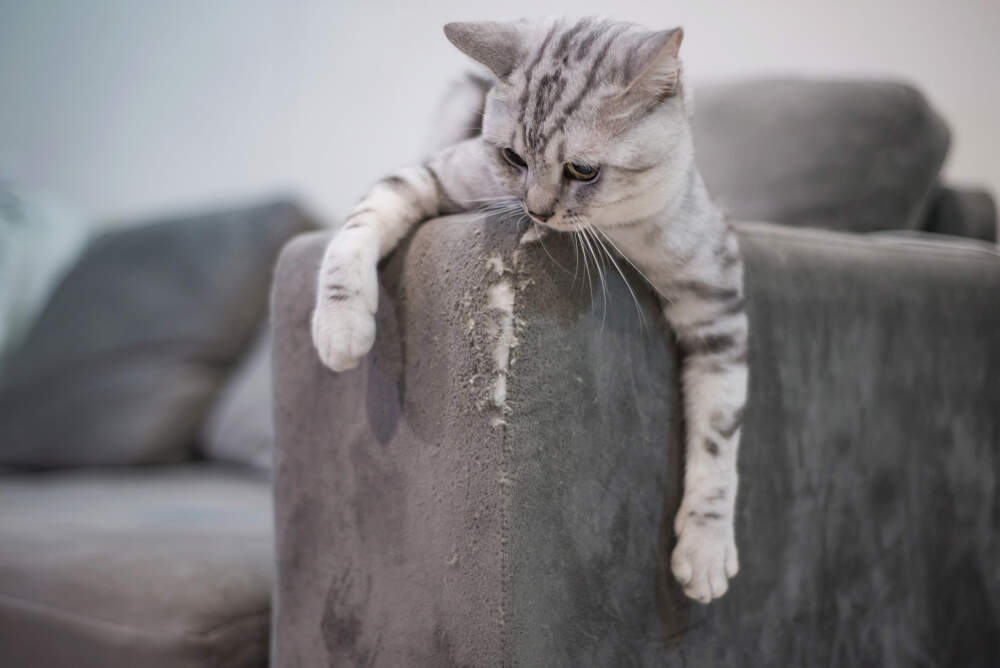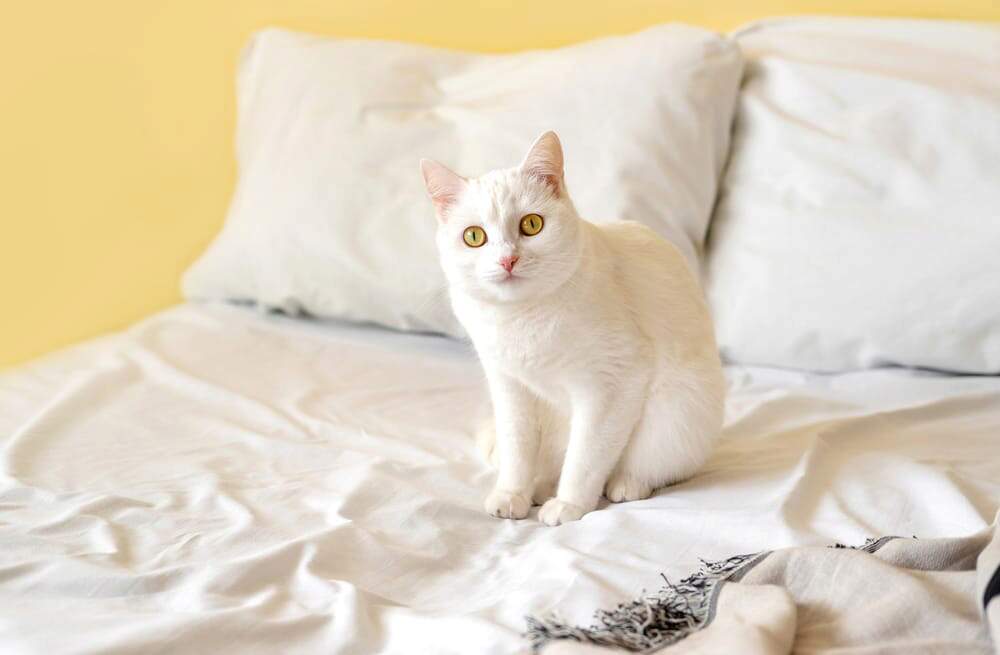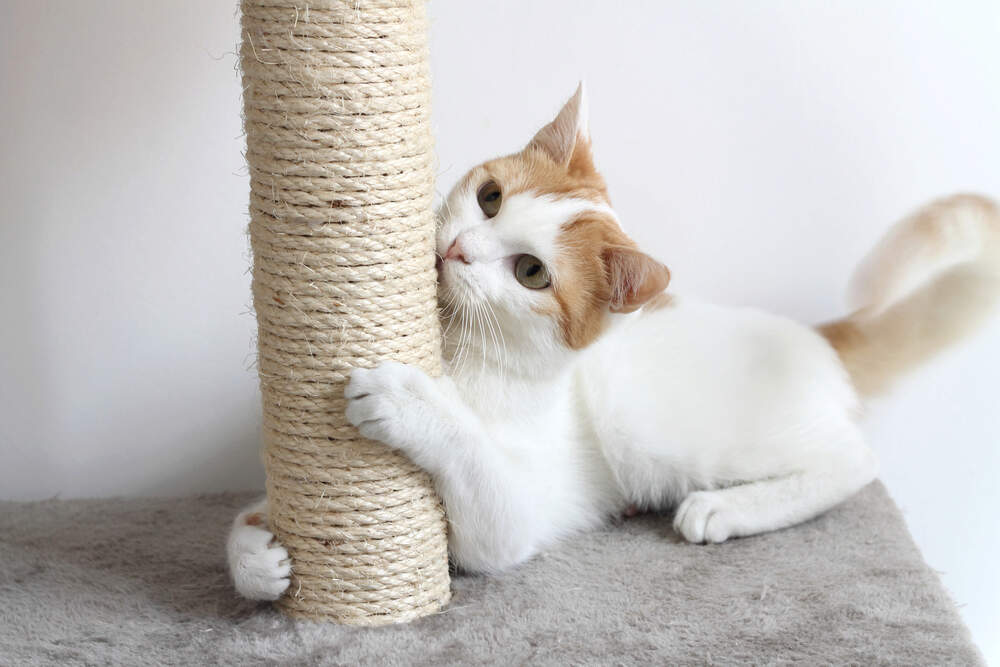How Do I Help My Cat with Behavioral Issues?
Sometimes cats can start scratching up carpets and walls, spraying, or even becoming a bully toward other pets or you. If your cat is making a mess of your house, you shouldn't let that go unchecked. You need to find the cause and address the situation.
If your cat's behavior has suddenly changed, this might be from unaddressed stress, nervousness, or a significant adjustment in his life. If your schedule recently changed, for example, then your cat might start acting out as a result. So how can you help your cat? Start by doing what you can to help him feel more confident, safe, and secure.
A Big Change Can Be a Trigger
Many things can cause a cat to feel insecure and act out. Merely rearranging furniture can trigger insecurity. If you worked from home during the pandemic and now you're leaving for work, your cat might feel stressed. Don't forget that your kitty can pick up on your nerves too. If you're feeling stressed about returning to work, your cat could reflect those feelings.
Other pandemic-related changes might also trigger some insecurity in your cat. Maybe you and your friends and family are vaccinated, so now you have them over more frequently to visit. Or you're traveling again or just leaving the house more in general than you used to. Any of these actions, big or small, could be enough to cause your cat to feel stressed.
Other changes can leave your cat feeling insecure, like moving homes, getting a new pet, or bringing home a new baby. Even a stray animal wandering around outside can add to the insecurity. Take some time to consider what triggers in your home could lead to this unwanted behavior.
Watch for Health-Related Causes
Although these sudden changes in your cat are often the result of stress or nervousness, sometimes health reasons can be the culprit. For example, if your cat chews frequently on things, it could be a sign your cat has issues with his teeth.If your cat has a sudden change in behavior, it's a good idea to see your veterinarian.
Sometimes Boredom Is the Culprit
Yes, cats get bored. Sometimes your cat simply has too much pent-up energy and has to get it out in some way. This extra energy might manifest itself in scratching up the carpets or walls, spraying, or lashing out at you! If she was used to having you around the home, she might feel bored if you're gone for hours at a time.
In these situations, consider setting up things to keep your cat entertained. Give your cat "kitty TV" by leaving the shades open and setting up window perches. You can even leave a TV on and set it to a cat-focused or nature-focused channel.
Set up cat scratchers around the house, using both vertical and horizontal varieties. Sometimes, cats scratch things you wish they wouldn't because they don't have good alternatives. Put a little catnip on the scratchers to entice your kitty.
Interactive toys can also help with boredom. Try the Kitty Tippy Track n' Roll Cardboard Toy or the Creative Kitty Roller Toy. A cat tunnel with catnip for your kitten to play in can also be a good outlet for your cat's pent-up energy.
Try Comfort Zone Calming Products
Your cat's e-meow-tional health is just as important as his physical health. Comfort Zone products are designed to help cats feel safe, happy, and calm using signals they understand. Comfort Zone drug-free calming solutions come in a wide range of products to help your pet's emotional well-being.
Try the Comfort Zone Calming Diffuser or the Comfort Zone Multi-Cat Diffuser if you have more than one cat. Use the diffusers in the rooms where your cat spends the most time. If your cat goes outside or has a lot of indoor space to explore, you should consider using the Comfort Zone Calming Collar.
Comfort Zone products may help curb unwanted behavior and help with relaxation. You can also spray the Comfort Zone Spray & Scratch Control Spray directly onto areas where your cat most frequently scratches or sprays to discourage return visits.
Help Your Cat Feel More Confident
Cats that feel threatened or less confident might lash out. But all is not lost. There's a lot you can do to build your cat's confidence. Increasing the bond with your cat through play or clicker training is a great way to build self-esteem.
Cats with more "vertical space" also tend to feel more secure. They know they can escape other pets if needed, and they have more "territory" to own. Try setting up cat trees and Hangin' Cat Condos.
Your Cat May Become a Captivated by the Feel of Something
Sometimes unwanted habits stem from your cat being captivated by an object, often focused on how something feels. A cat might chew spiky things, like broom bristles, or he may be drawn to plastic, like the six-pack rings on soda packs. Or he may want to claw and scratch at soft blankets until they are ruined. If your cat is preoccupied with an object, make the item he's focused on harder to reach. Put brooms away, cover electrical cords with hollow tubing, keep houseplants hanging from the ceiling where he can't get to them, or fold soft blankets and only take them out when you need them.
If you catch him focusing on an item, just say a gentle no and take the item away, redirecting his attention somewhere else, like a feather wand or a scratching post. Sometimes a bitter spray that's safe for cats can help. Don't yell at your kitty or scare him. Just focus on redirecting his attention to healthier targets.
Change Can Play a Role
If you recently changed your schedule, your cat might be feeling a bit nervous about the change in your routine. Maybe you two were attached at the hip while you worked from home during the pandemic, and now you're gone eight hours a day. Maybe you're just leaving the house more often than you used to in the early stages of the pandemic. These are situations many cat owners face as more locations open back up thanks to COVID-19 vaccinations. Change can cause unease, vulnerability, and stress as your cat deals with not having you around all the time.
If you think this is causing your cat's unwanted actions, then extra bonding time can certainly help. You can also work to make the time you leave in the morning a "fun" event rather than a dreaded one. Consider distracting your kitty by sprinkling treats around the house for a scavenger hunt that engages him after you leave. Or change up your routine, so you perform activities in a different order right before you leave. Try offering distractions during the day, like using an automated treat dispenser.
A lot of factors can cause your cat to develop undesirable behaviors. By following the advice in this guide, your cat will feel calmer and safer, allowing you both to enjoy a happier home.






